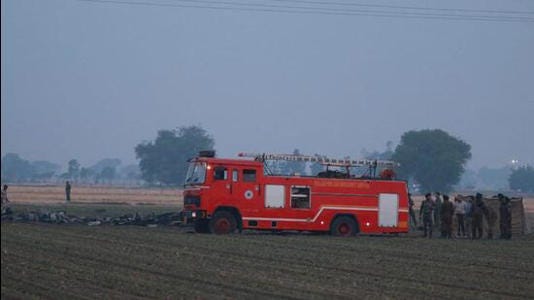Epicentre of Escalation: Panth-Punjab and the Unfolding Indo-Pak Conflict
South Asia is hurtling towards a crisis that will gravely impact the Panth and Punjab.
Video footage from Akalian village in Bathinda, Punjab shows the crash site of a downed Indian jet.
Punjab stands in the eye of a dangerous geopolitical storm. India’s military strikes on Pakistani soil and its unprecedented unilateral suspension of the Indus Waters Treaty, signals that South Asia is hurtling towards a crisis that will gravely impact the Panth and Punjab. Today’s events are not distant border skirmishes or mere diplomatic posturing—they directly implicate our land, our waters, and our people.
India's suspension of the Indus Waters Treaty—a move Pakistan explicitly warned would constitute an act of war—has not only heightened the immediate risk of escalation but is symptomatic of India’s broader strategic objective to weaponize natural resources. Reports of reduced flows in the Chenab River confirm that this policy could spell ecological and economic catastrophe, directly affecting Punjab, whose own waters have long been forcibly diverted by Delhi for India's broader nation-building projects.
Earlier today, India announced it attacked three different locations which it describes as "terrorist infrastructure." Pakistani sources are accusing India of attacking civilian targets and reporting one child has died with several others injured. On the other hand, Lieutenant General Ahmed Sharif of the Pakistani Army told CNN that Pakistan has retaliated and downed multiple Indian jets, including one in Bathinda which obviously demonstrates the impacts and centrality of Punjab in any ensuing conflict. Local sources have reported that the plane fell near Akalian village and the pilot was killed in the crash although we are waiting on further details. Sources report that perhaps five Indian jets have been downed by Pakistan.
Critically, all these escalations revolve around Punjab. Border districts like Fazilka, Ferozepur, Amritsar, Gurdaspur are frontline zones, situated within immediate artillery and missile range. Military cantonments in Jalandhar, Bathinda, and Pathankot have already been activated, transforming Punjab into a militarized zone characterized by increased civilian surveillance and emergency security measures. This militarization directly threatens Punjab's already strained agricultural sector, as critical water infrastructure linked to the Ravi, Beas, and Sutlej rivers risks becoming bargaining chips or collateral damage.
This militarization and resource control serve a dual purpose for Delhi. Beyond pressuring Islamabad, India's BJP-led government can seek domestic consolidation amidst economic struggles and international scrutiny over its transnational repression. The crisis can conveniently position Sikh dissent as an "internal threat," portraying pro-Khalistan activists as proxies of Pakistani interests in a renewed bid to clamp down on Sikh dissent.
Simultaneously, global geopolitical tensions between the United States and China—highlighted by strategic projects like the Belt and Road Initiative and the China-Pakistan Economic Corridor—further complicate the regional context. Conflict in Kashmir would directly disrupt these economic projects, underlining that the stakes extend far beyond local or national interests.
India's suspension of the Indus Waters Treaty is not just diplomatic theatre—it is a strategic escalation, weaponizing water against Pakistan, which Pakistan has explicitly warned would be considered an act of war. Al Jazeera is reporting that the Jhenab river has already had its flows reduced which could be catastrophic and present an existential crisis for Pakistan. India has been making efforts over the past several years to renegotiate the terms of the Treaty, and seems to be taking advantage of this incident to do so.



